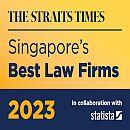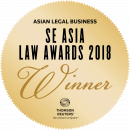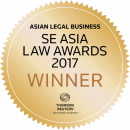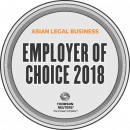Family and Matrimonial Law Co-Head Koh Tien Hua and Associate Phoebe Sim were mentioned in the Straits Times article titled "Apex court reverses decision in custody battle between Singaporean dad and Mongolian mum over 6-year-old son"
Eversheds Harry Elias Family and Matrimonial Law Co-Head Koh Tien Hua and Associate Phoebe Sim were mentioned in the Straits Times article titled "Apex court reverses decision in custody battle between Singaporean dad and Mongolian mum over 6-year-old son". The article was first published on 20 August 2018.
Apex court reverses decision in custody battle between Singaporean dad and Mongolian mum over 6-year-old son
SINGAPORE - Reversing a High Court decision, the Court of Appeal has ruled that a six-year-old boy with special needs at the centre of a five-year custody battle will remain here in the care and control of his Singaporean father instead of his Mongolian mother in London.
But the court also underscored that both parents should continue the strong bonds with the child - referred to as M in court papers to protect his identity - specifying special access arrangements for the London-based mother, which will be reviewed in a year.
"We are conscious that the outcome of the appeal will be deeply disappointing to the mother. She has spent years trying to have a normal relationship with (the boy) and we commend her efforts in that regard," wrote Judge of Appeal Judith Prakash in a 47-page judgment released on Friday (Aug 17).
The court, which included Judges of Appeal Tay Yong Kwang and Steven Chong, added that the "focus of the appeal has been on M and what would be best for him rather than on the behaviour of any of his relatives".
The saga began in 2013 when the Singaporean father and his Mongolian wife brought M here from London, ostensibly for a short visit.
Once in Singapore, the boy's father served divorce papers on his mother and applied to restrain her from taking her son back.
Thus began a stormy custody battle that stretched some five years and had seen both parents spend time in jail as they tried to wrest custody of the child.
In September last year, the High Court ordered M to be returned to London within 28 days to reunite with his mother.
The boy has been living here for the past five years with his Singaporean grandparents and, more recently, in the care of his father who had fled from England in 2016 to return here.
On appeal before the apex court in April this year (2018), the only issue was who would have control over the child's daily life. Both parties accepted the order for joint custody.
The father applied to adduce fresh evidence in the appeal, which the court allowed in the form of three reports including one from a consultant paediatrician in January this year which confirmed M's diagnosis of autism spectrum disorder (ASD).
The report showed that he had made good progress, and stated that his condition could stagnate if the early intervention programme he was undergoing was disrupted.
Two other reports came from M's kindergarten vice-principal and a report regarding M's performance in an early intervention programme and the father's involvement role in it.
The father's lawyers Adrian Tan and Janus Low from August Law Corporation argued that the judge who ruled in favour of returning M to the mother had wrongly found or assumed that she would be able to meet all of M's emotional, developmental and material needs.
They pointed to the context of M's life to date - he had been cared for by his grandparents for a large part of his life, and not the mother, and by his father since September 2016.
They added that the mother is living by herself in England and has no support group, among other things.
Lawyers Koh Tien Hua and Phoebe Sim representing the mother countered the issues raised, pointing to her continuing warm relationship with M and to the network of friends from her expatriate community and her local church as support, among other things.
On the evidence, the court found M's best interests would be better served if he remained in Singapore with the father and the grandparents.
The court noted that M's bond with each of his significant caregivers was neutral, but the capacity of the parties to provide for M's emotional, developmental, and material needs weighed in favour of the father.
It added that the impact of change and the need for stability in a child's life was a factor which strongly weighed in favour of continuing the current arrangements in Singapore, given M's ASD condition, which was diagnosed in March 2017.
The court also noted the mother's uncertain immigration status in the United Kingdom, citing that she has no permanent right of abode there yet.
If M goes to live with her, there would be " significant instability" if and when she were required to leave the UK and return to her own country where the language and social conditions are different.
"That would require M to make another major adjustment at a fairly young age," said the court, noting that M is a Singaporean with secured residence here.
Given the mother's special circumstances in being London-based, the court ordered, among other things, that the father shall sponsor the mother for at least two trips to Singapore per calendar year, with each trip not exceeding four weeks.
For each of the trips, the father was to provide the mother with return economy class air tickets and $2,000 to fund her living expenses while in Singapore.
The court further ordered access arrangements to be reviewed by the High Court in one year's time, and thereafter, at such intervals as the Family Division of the High Court deemed necessary.
Author: K.C. Vijayan, Senior Law Correspondent, The Straits Times
For more information, please contact our Business Development Manager, Ricky Soetikno at rickysoetikno@eversheds-harryelias.com













